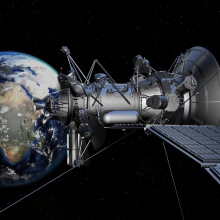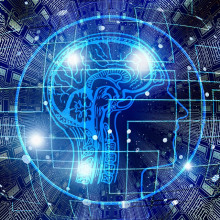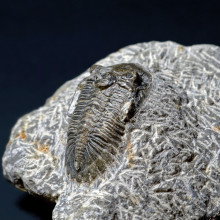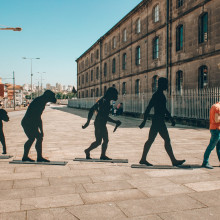What should we make of claims that China is building super weapons to hack and hijack US satellites? Also, the new app to help midwives detect health conditions in newborns, and we hear from the couple who have discovered one of the world's most important fossil deposits, almost on our own doorstep!
In this episode

00:56 - Is China gearing up for war in space?
Is China gearing up for war in space?
Isabelle Hilton
The competition between China and the United States is nothing new, but Beijing’s attempt to rapidly develop a space programme has given rise to claims that the world’s two most important powers are embarking on a new “space race”. It follows the leak recently of a top-secret CIA intelligence report, which suggests that China is building cyberweapons and “attack satellites” capable of destroying rival American space assets, probably with an eye on acquiring Taiwan. So, should we be concerned? Journalist and leading China expert, Isabel Hilton...
Isabel - China has had a space program for many years, but what's changed really is the geopolitical relationship between China and the United States. And what that has done is raise the question of space as a new domain for warfare. So any Chinese investment in space, in space technologies, in its ballistic program, in its satellite program will be interpreted by US Security Services as a potential threat because that's their job. They're there to monitor what the potential enemy is doing. And since China and the United States are now in confrontation, then they are concerned now, how concerned should we be? Well, it's obviously worrying that space would become a warfare domain. After all, all of modern life depends on space technology. So when those things become possibly a theater of conflict, we all have to be concerned. If you are looking at what you could call in rather old fashioned terms, a space race, then the United States is still a long way ahead of China. China's investing, but the United States is investing more and has invested over a longer period of time, has more technology and more partners crucially. So it's not really a question of China overtaking the United States tomorrow, but as any defense establishment does, they think of the future and they try to plan for it.
Chris - You mentioned partners, and that's interesting because China has very few, they're not very space enabled, but what America's tending to do is invest in projects which are globally reaching. Their aim is to do things like, let's get to the moon and see what that can do for the world. Whereas China seems to be sending out the message, let's get to the moon and see what that can do for China.
Isabel - You are absolutely right and the Chinese based program is substantially military and defense. And even with the question of satellites, which are, you know, GPS or communication satellites, the whole program is still under the control of the military. Whereas if you look at the payload, for example, of American rockets, it's substantially civilian.
Chris - I've been reading about some really quite scary stuff like, it's the wrong analogy to use, but satellites that are almost like Russian dolls with satellites hiding inside them where you can deploy a baby satellite that comes out that might attack something else. People are saying the next war will be fought from space.
Isabel - It looks very much like a military program. And I mean the problem is that destroying each other's space as assets is a doomsday weapon. I mean, that is very, very serious damage. So unlike the nuclear programs, we don't have generations of talks and treaties to examine what would be a catastrophe for all humanity and seek to limit it. We don't have that in space. I mean, space is not meant to be militarised. However, we seem to be nudging that. And if you look at what is being said, for example, about a potential war over Taiwan, which is probably the most likely conflict in the near future, it is very much discussed that China could and might seek to destroy all American assets in the region very early on. And that would include satellites and that puts people back past the machine age. So it is very dangerous to regard this as something that could be done casually and without consequences.
Chris - The one thing that certainly has changed in China is there's now a burgeoning middle class. There's been a huge flow of money because we are all buying stuff that they're making and many are saying, what would President Xi get from a war because it will cost him money and it will certainly cost him income from the rest of the world who would do to China what we've done to Russia with various sanctions and so on. So at the moment people are arguing that we need to continue to trade with China and keep the money flowing because otherwise they will be incentivised to move in the direction that you've been saying.
Isabel - I think the worrying thing is that if you read what is being written in China in official documents under Xi Jinping, it is a very, very different tone from his predecessors. More than 10 years in, he's still purging people. He seems very fearful of his position. And if you translate that into geopolitics, the Chinese state seems to regard the United States as a completely hostile power. All the documentation that they produce implies that there is nothing to be done by negotiating with the United States because the United States is determined to cripple China. Now, once you get into that sort of confrontation, it's very difficult to see the path towards mutual tolerance, if you like, mutual understanding. And so the fact is, we actually don't know what Xi Jinping's risk appetite is. If you are afraid for the party's position and your own position, then things that could look like a gamble become possible options. And we've seen that with Putin. You know, there was frankly not a lot to be gained for Putin by invading Ukraine. He lost Nord Stream 1, Nord stream 2, he lost his major customer in the European Union, but he did it anyway. So it's very difficult to say with certainty that there are no circumstances under which Xi Jinping would not contemplate a war.
Chris - Is it tech that's the magnet for them? Is it what Taiwan have got - advanced microchip manufacturers and so on? Is that what they're after? Because there are some things which while they're very good at mass manufacturing, the Chinese have not got, and this is things like microchip manufacture. It's like the advanced methodology that we use to make jet engines and so on. And there's a reason why there are three big manufacturers of jet engine parts and none of them are in China and none of them want to open a factory in China.
Isabel - Well, of course the big asset that Taiwan has is a company called TSMC, which manufactures about 60% of the world's most advanced microchips. Now, China can produce much lower level chips, but it's highly dependent both on American supplies and on Taiwan. I don't think that is the primary motive for seeking to recover Taiwan. Xi wants to be seen as a historic figure. There's only one big job left, and that is, as the party would put it, the recovery of Taiwan. Now of course, the Taiwanese see this very differently and because we've had perhaps now two efforts at making work of Deng Shao Ping's formula of 'one country, two systems' once in Tiber and once in Hong Kong, and they both ended with Chinese repression. The Taiwanese are extremely wary of Chinese promises, and they will seek to preserve the status quo as long as they can. And as time goes by, the pressure on Xi Jinping to change that status quo for political reasons will grow. TSMC could be a hostage in this. The world's microchips are are very much at risk here again, it's a reason that the entire world needs to be concerned about the fate of Taiwan.

09:15 - Midwifery app helps screen birth conditions
Midwifery app helps screen birth conditions
Lindsey Rose, Anglia Ruskin University
A midwifery lecturer at Anglia Ruskin University has developed a new app that aims to help healthcare practitioners, educators and student midwives screen for health conditions at birth. Lindsey Rose is the brain behind it…
Lyndsey - I wanted to have a resource for my students originally to do this really complex examination for newborns that every baby has at seventy, seventy two hours of birth. And again, at six weeks, I wanted a quick and easy resource that they could just flip up from their pocket and get everything that they needed to know.
Chris - These are the things that you are looking for, because we always say prevention is better than cure. Pick stuff up early and you can intervene and solve problems before they become an issue.
Lyndsey - So it's screening, it's not diagnostic. It's screening and it's an educational tool to help. We look mainly at hips, heart, eyes, and testes in these babies. But the app actually covers much more than that because it's a holistic examination.
Chris - Was this a particular problem for midwives? Remembering and feeling sufficiently resourced to do these checks thoroughly then in the past?
Lyndsey - I don't think so much that it's a particular problem. It's just really nice to have a handy resource that you can use in practice. So that, and also links to the online screening committee, national screening committee's guidelines, so that when things change, they can just make sure they get the appropriate information. So it's all about having that quick and easy resource. It's also very dynamic. It's got heart sounds on there. It's got lots of pictures. All the pictures were drawn by students who did a competition to get the work. So yeah, I'm really proud of it.
Chris - I've had a go. You sent me a login. It runs on a phone. You can also do it on a desktop. I was quite pleased about that because often you are forced onto one device with these sorts of things and yes, I found the heart sounds, and I was impressed because when I was a medical student trying to find good quality heart sounds you could listen to, to learn what you are listening for, it was almost impossible. So how did you do it?
Lyndsey - I had a wonderful colleague, down in Dorset and she very kindly collected some heart sounds for me and yeah, just working, going into practice and we bought a digital recorder. It's about networking, I think, and that this app has really enabled that.
Chris - Is this effectively that in the 21st century, what we in the medical trade used to call cheese and onion. We used to have a book, the Oxford Handbook of Clinical Medicine, which every starting out doctor and medical student had in their pocket, which was basically the reference book. You go to that for all the clinical science and things. My copy looked very, very thumbed by the end of my training. Is this the 21st century? This is the equivalent really of that for midwives.
Lyndsey - Yeah, that's what my research is all about actually for my PhD is looking at, using digital technology and in healthcare and so that patients feel comfortable that you're actually on your phone while you're caring for them.
Chris - Well, I was going to say that because the one thing that really upsets patients. And it upset me. I went to see a GP to get a form signed recently and I didn't look the person in the eye once because they were looking at a computer screen and, the thought that you've got someone with their new baby and the healthcare worker flips out a phone and just stares at a phone. Are patient's comfortable with that sort of interaction?
Lyndsey - I think they're going to be over time. Maybe not straight away, but what's lovely about the app is the midwife or whoever's doing the examination can actually show them what they're looking at, show them some diagrams, let them listen to the heart sound, say this is what I'm listening for. And because it's so interactive, they can actually involve the parents in it as well.
Chris - How's it been received?
Lyndsey - Really, really well. It's going, it's being taken up quite well across the country for the universities and for individual midwives out there as well. So I'm really looking to try and get into GP practices because the examination, the NIPE examination is done again at six weeks and they check the same things again.
Chris - Overseas?
Lyndsey - Yes. And overseas, we're working at the moment with Karolinska Institute in Sweden for their medical students there because their midwives don't do this examination. The doctors do it there, but also in third world countries. I'd really love for them to have it so that conditions, particularly congenital cataracts, are picked up early. People know what to look for and maybe can get treatment.
Chris - And just very briefly, what's it called and how do people get it or find out more?
Lyndsey - It's called NIPE, which stands for Newborn Infant Physical Examination. Textbook in a pocket and it's on the Apple store and the Google Play store.

14:11 - Godfather of AI steps down and 'regrets work'
Godfather of AI steps down and 'regrets work'
Josh Cowls, Oxford University
The man widely considered to be “the godfather” of artificial intelligence has decided to leave his job at Google after warning about the growing dangers of AI. Geoffrey Hinton said that he was leaving the tech giant and that he regretted his work around artificial intelligence. I’ve been speaking to Josh Cowls from the Oxford Internet Institute at the University of Oxford about what some of those dangers are, beginning with why they seem to be so poorly defined…
Josh - I think a lot of the problems with communicating the potential risks and harms of AI are the multiple different timescales that we can think of. So some people would like to talk about the potential of AI to sort of take over humanity or, or make us, uh, work for it rather than vice versa versus other scientists. And I would consider myself among this group who think a bit more about the current and near term potential risks of AI. Now, the reason that gets a bit complicated is because the scientific progress of AI is moving really rapidly, and people like Geoff Hinton talk about being a bit surprised about how quickly the technology has moved on. So for some people, that brings the longer term harms more into the focus. But I think for me, some of the more concrete potential harms of AI that are sort of staring us in plain sight are also important to take a look at as well.
Chris -
And what are they?
Josh - So some of them are around bias. So AI is trained on large sets of techs, often from the internet. So that means that AI is basically in some ways being trained to reflect the society in which it's participating. And of course, society isn't perfect, and the kind of biases which can come across through text might be relayed into AI. Another concern is around what we call disinformation, which is the risk that AI can spread falsehoods, or things that seem true, but aren't actually true. For example, the New York Times recently did a test of the open AI ChatGPT system to see how it responded to a prompt about a conference, about the founding of AI in 1958. And it found that that response from open AI created numerous falsehoods which really didn't happen. They claimed that the New York Times had a front page story about this AI conference. That wasn't true, and many other things weren't true either. The trouble with AI systems is that we can't necessarily tell the difference between what is true and what is false when it's coming out of the text boxes with which we interact with it.
Chris - Yes, indeed. I looked up what ChatGPT thought about The Naked Scientists, and it told me that Patrick Moore, the famous astronomer, used to be in The Naked Scientists and in fact helped found it, which I wish that were true, but it's not. Beyond that though, how do you see this being placed in society? How do you see it being used?
Josh - I think the really significant contribution is this conversational style which they adopt. So I think one of the dangers they introduce is the fact that we might be lulled into thinking of these systems as in some ways intelligent or even sentient beyond their actual capacity. And so that might shape and turn how we make decisions because we've long had assisted decision making in things like criminal justice, also health, these assistance are increasingly being used, but how to do that within a safe and ethical framework is the really important thing. And I think the danger with these kind of off the shelf products like ChatGPT, is that we start to take what they say as true, but also that we start to sort of incorporate those statements and those responses into our day-to-day lives in ways that are quite hard to trace back to the AI system, let alone how the AI system came to that decision. So I think what's really interesting about this most recent generation of AI chatbots is their conversational ability, their ability to make us feel like they are listening to us, responding to us, and understanding what we mean. And that they kind of know what they're replying back to us which isn't really the case.
Chris - One of the issues though with all of this is that it's not explainable. If you ask people who work in AI how it works, even Google <laugh> say that they don't understand how their system produces some of the outcomes and outputs that it does. It's not so-called explainable. It can't tell you how it reached the conclusion it did. And that makes people inherently uncomfortable because throughout societies and how we do things, we document things, we take minutes at meetings, and then we explain why we've made the decision that we have. And if we have a black box where we put inputs in and outcomes come out and we don't know what connects it to the middle, that seems to me to be extremely disconcerting.
Josh - That's right. Explainability is another major challenge for AI, both technically with people working on the ground to try to make AI systems more explainable. And this is where I think regulation is really going to come into it. The European Union is coming up with its own artificial intelligence act which creates new safeguards and standards for companies deploying AI systems. And it may well be that those standards are adopted elsewhere as well, which could push the owners back onto the companies developing and deploying these systems. The worry is that when these systems become so embedded in work, in life, and everything else, it may be that the genie is too far out the bottle and that some of these outputs have already worked their way into the messiness of human life in a way that it's tough to extricate. But I'm sure that governments and others will be looking at ways to try to respond to that.

23:21 - Treasure trove of fossils found in lockdown
Treasure trove of fossils found in lockdown
Joseph Botting & Lucy Muir
One of the world's most important fossil deposits has recently been found in Wales. Husband and wife team, Dr Joseph Botting and Dr Lucy Muir, made the discovery during the pandemic lockdown.
Joe - Almost all of the fossil record misses the vast majority of animals because you only get fossilized, the bits that are the heart, the minimal shells, the bones, the teeth, that sort of thing. But there are very, very few places around the world where you can get by some sort of fluke of chemistry, the preservation of soft tissues, entire animals, extremely delicate structures. And we stumbled across a site like this near our home.
Chris - Lucy, how did the two of you find this? Was this just at one of those lockdown walks?
Lucy - Well, we actually found the site about 10 years ago and had done a bit of work there collecting fossil sponges, which is what Joe worked on. And then it came to the lockdown. Joe thought, 'oh, I'll go and get a few more specimens from that quarry, then I can write that up'. So he went out, hammered some rocks and found a little worm tube with tentacles coming out. And at that point we knew there was a lot more there than just sponges.
Chris - And Joe, the quality of what you've got, is it because the preservation is so good that you've got insights at very, very detailed levels? Or is it just that there's such a huge diversity there? Or is it both?
Joe - It's both. Yeah. We have something like 170 species we think so far. But the point is it's everything. So we don't seem to be missing any major parts of the ecosystem. We've got everything from tiny little worms to little crustaceans to strange tentacle monsters. Mostly they're just one or two millimetres along, but the detail within them is absolutely stunning. And it goes down to the micron scale. So a thousandth of a millimetre resolution in some of the features that we're seeing. We've got the little arthropod that's two millimetres long and preserves its brain and its optic nerve and the eye, and another one with a gut that's 20 microns wide, 20000th of millimetre. It's just extraordinary.
Chris - You mentioned Lucy and Joe, the fact that these are very, very small. I was staggered when I read your paper to learn that although you are honorary academics at a nearby institution, you basically had to crowdfund to buy a microscope to do this work. You've done this as almost citizen scientists.
Lucy - Yes, that's right. We very soon realized that our small adequate microscope just couldn't visualize the things that we were finding. So we actually tried crowdfunding to get a good microscope and a good camera, and people were incredibly generous. And we raised £18,000 and got two microscopes and two good cameras. So we can actually photograph the fossils, we can publish papers about them so that everyone knows about them.
Chris - That's a microscope each, isn't it? Fantastic. And Joe, this assemblage that you've got dates from about 462 million years ago, what is the importance and relevance of that point in the timeline?
Joe - Yeah, this is an interval which is very important in the evolution of life. It's before the origin of land plants, before there was anything living on land, but after a period called the Cambrian, when we have a lot of these foreigners that tell us how the first animals got going, but it's in a sort of gap in the record where we know life was diversifying spectacularly. The ecosystems were getting much more complex, but we only really know that from the 'shelly' fossils, the brachiopods and trilobites. So this falls into this gap and fills in a huge hole in our knowledge. Because it's telling us what all the soft bodied animals were doing at the same time.
Chris - And Lucy, do you know why what you've found is there, as in why it's been so well preserved and why you've, you've still got it for you to find today?
Lucy - The short answer is that's some of the work we're going to be doing over the next few years. We've got some ideas. We know that the animals that became the fossils were buried alive probably by sediment lumps. And we think there might be something a bit odd about the seawater chemistry because we don't normally see this type of soft tissue preservation at this age. So the area was a volcanic island complex. So we think maybe all the volcanic activity made the seawater chemistry a bit odd and that somehow allowed things to become preserved that would normally just have rotted away.
Chris - In your paper, Joe, you point out a lot of the animals are juveniles. So is it that this is just the right place for young animals to be reared? Is that why you think that that volcanic island complex is got so many juveniles in there or is there some other reason why they're so heavily represented here?
Joe - It's actually very difficult to interpret this because there's only one species that we can be sure of. We are looking at juveniles and that's a trilobite that normally gets up to about six centimetre long and here it gets up to five millimetres. Everything else, including a lot of these strange soft body things, are actually the same sort of size, a millimetre or two, as they are in the modern day and much smaller than they were in the Cambrian before it. So we think that possibly an ecosystem maybe attached to undersea boulders and so on, where you have a small sort of forest, if you like, of little encrusting creatures. And only small animals could really fit into the ecological niches there. So the adult trilobites were off living somewhere else, but they left their juveniles to grow up there. But we don't know at this stage whether a lot of the other small crustaceans and so on were juveniles or whether they're actually adults of the same sort of size as they are today. It's going to be quite hard to work that one out. We're just going to need a lot more fossils.

29:18 - How long does evolution take?
How long does evolution take?
How quickly does evolution happen? The short answer is: it depends on what you are, and where you are.
Evolution is the process in which a living organisms’ heritable traits change as successive generations replace one another. And so if the physical changes of evolution are mostly instigated by molecular changes, therefore evolution only happens when it needs to. Animals like sharks and crocodiles have remained relatively unchanged for hundreds of millions of years because.. Well they just work. But they’re outliers in evolutionary terms, nearly everything else has undergone change in that time period. So how does the genetic mutation responsible for evolution happen? And here to explain is the University of Plymouth’s Andy Foggo.
The process starts with the occurrence of usually small, but heritable, changes in the genetic code of organisms These occur as a result of things like hybridization, mistakes in copying of the code when cells divide, and environmental triggers such as background radiation, from natural sources like sunlight.
These genetic changes which are the actual stuff of evolution can happen on a timescale of seconds, so in that sense evolution can be thought of as being very fast.
Getting these molecular changes to spread in a population to the point where the physical, chemical and behavioural differences between individuals result in new species, that takes much longer. This can range from a few weeks in the laboratory to millions of years in nature, there are no rules here.
Evolution is therefore both very, very fast, and unbelievably slow. And since evolution can only happen when traits are passed down through generations, the speed at which an adaptation becomes the norm is specific to how large that organism is, how complex its genetic code is, and how quickly that organism can reproduce.
The things that affect the rate of evolution more than anything are the size of the organisms, and the environmental conditions in which they occur. Generally, the smaller the organism, the faster the generational turnover. The faster that turnover, the greater the chances of a change occurring, the greater the opportunities for natural selection to act and the faster the accumulation of difference.
But aside from that, there are other determining factors as well.
Environments with higher background levels of ionising radiation and higher temperatures usually have higher rates of cellular metabolism, division, mutation and hence opportunities for both forms of evolution too.
So unfortunately because of all of this, we can’t say what the speed of evolution is, but we can say that places like the tropical rainforest are where it happens the fastest.










Comments
Add a comment